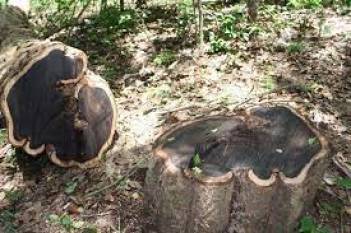MUMBAI, 22 April 2024: African Blackwood, also known as Dalbergia melanoxylon, is a tree shrouded in mystique. Its dense, jet-black heartwood is considered the most expensive wood in the world, fetching prices exceeding ₹7 lakh per kilogram.
This ebony treasure, coveted for its exquisite beauty and acoustic properties, is used in crafting high-end musical instruments, luxury furniture, and decorative items. But with a natural habitat restricted to Africa and strict regulations on its trade, the question arises – can India cultivate this "Ebony Enigma" and reap its economic benefits?
Benefits Beyond Beauty: The Allure of African Blackwood
The allure of African Blackwood goes beyond its captivating aesthetics. The wood boasts exceptional hardness, durability, and a flawless polish, making it ideal for crafting clarinets, oboes, and other fine woodwind instruments. Its exceptional acoustic properties enhance the instrument's tonal quality, while its resistance to cracking ensures longevity. Beyond the realm of music, African Blackwood finds use in luxury furniture, knife handles, and intricate carvings, catering to a discerning clientele willing to pay a premium for its exclusivity.
A Foreigner on Indian Soil: The Current State of African Blackwood Farming
Unlike Agarwood, which has a native Indian counterpart (Aquilaria), African Blackwood is not indigenous to India. Therefore, its cultivation faces unique challenges. Importing live plants or seeds is strictly regulated under the Convention on International Trade in Endangered Species of Wild Fauna and Flora (CITES). Currently, there are no large-scale African Blackwood plantations in India. However, some research institutions and a limited number of private farmers are exploring the possibility of cultivating the tree under controlled conditions. The exact number of farmers involved is difficult to ascertain due to the nascent stage of this practice.
Looking to the Horizon: The Future of African Blackwood Farming by 2034
The future of African Blackwood farming in India by 2034 presents intriguing possibilities. The global demand for luxury goods, including high-end musical instruments and bespoke furniture, is projected to rise steadily. With a limited supply of African Blackwood from its natural habitat, ethically sourced, cultivated wood could command premium prices. By 2034, India could potentially position itself as a sustainable supplier of this precious resource, provided it overcomes the initial hurdles.
Government Regulations: A Balancing Act
The Indian government treads a cautious path regarding African Blackwood. On one hand, it recognizes the potential economic benefits of cultivating this high-value timber. On the other hand, it prioritizes environmental responsibility and adheres to CITES regulations. Currently, there are no specific government policies promoting African Blackwood cultivation. However, research initiatives exploring its cultivation under controlled environments are underway. The future might see the introduction of regulations that balance economic benefits with environmental sustainability.
The Road Ahead: Challenges and Opportunities
The success of African Blackwood farming in India hinges on addressing several challenges. Extensive research is needed to determine suitable growing conditions, develop sustainable harvesting techniques, and ensure the quality of cultivated wood meets international standards. Additionally, exploring alternative income streams, such as carbon credits for sustainable forestry practices, could incentivize farmers.
Conclusion: A Calculated Gamble
African Blackwood farming in India presents a calculated gamble. The potential economic rewards are significant, but the path is fraught with regulatory hurdles and the need for extensive research. By fostering collaboration between government bodies, research institutions, and private farmers, India can unlock the potential of this "Ebony Enigma" while prioritizing environmental responsibility. Only time will tell if India can successfully cultivate the allure of African Blackwood and carve a niche in the global market for this precious wood.























